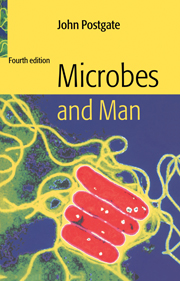Book contents
- Frontmatter
- Contents
- Illustrations
- Preface
- 1 Man and microbes
- 2 Microbiology
- 3 Microbes in society
- 4 Interlude: how to handle microbes
- 5 Microbes in nutrition
- 6 Microbes in production
- 7 Deterioration, decay and pollution
- 8 Disposal and cleaning-up
- 9 Second interlude: microbiologists and man
- 10 Microbes in evolution
- 11 Microbes in the future
- Further reading
- Glossary
- Index
9 - Second interlude: microbiologists and man
Published online by Cambridge University Press: 18 December 2009
- Frontmatter
- Contents
- Illustrations
- Preface
- 1 Man and microbes
- 2 Microbiology
- 3 Microbes in society
- 4 Interlude: how to handle microbes
- 5 Microbes in nutrition
- 6 Microbes in production
- 7 Deterioration, decay and pollution
- 8 Disposal and cleaning-up
- 9 Second interlude: microbiologists and man
- 10 Microbes in evolution
- 11 Microbes in the future
- Further reading
- Glossary
- Index
Summary
I grew up in an area when science and technology, inseparable in most people's minds (including my own), were wonderful things. I suppose one has to be tapping on towards eighty to remember the time when an aeroplane was a thing to be stared at, when the crackling wireless was a miracle, when funny bug-eyed cars edged horses to the side of the road, when one or two of one's friends had tuberculosis, and telephones looked like black daffodils made of weird material called Bakelite, originating from coal-tar. As the 1920s segued into the 1930s the seeds of modern communication, travel, medicine and plastics were germinating and scientists were leading society to a new and glorious dawn; mankind would live well-nourished, well-cared-for lives in a happy technological Utopia, fulfilling its creative potential in arts and science, untroubled by war, deprivation, hunger and cruelty, for there would be enough of everything for everyone. Bigotry, prejudice and vindictiveness would vanish as scientific rationalism prevailed, putting flight to tribalism and mysticism (dignified by the uninformed as patriotism and religion). H. G. Wells was our prophet and, though we may not have followed his ideas in every way, none of us doubted that science, technology and the well-being of mankind went hand-in-hand, with man himself most in need of shaping up.
How innocent we were! For today there is a positive surge of feeling against science. Science, to many, has generated the threat of atomic holocaust, destroyed the environment, released new poisons, carcinogens and illnesses on an innocent and unsuspecting public and has done nothing to alleviate the perennial plagues of society: unemployment, poverty, drug abuse and violence.
- Type
- Chapter
- Information
- Microbes and Man , pp. 291 - 307Publisher: Cambridge University PressPrint publication year: 2000



